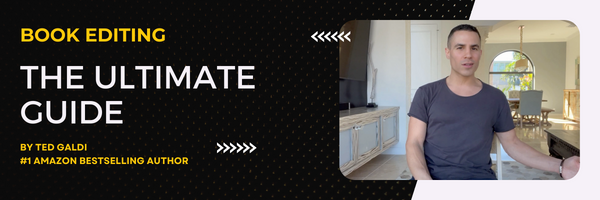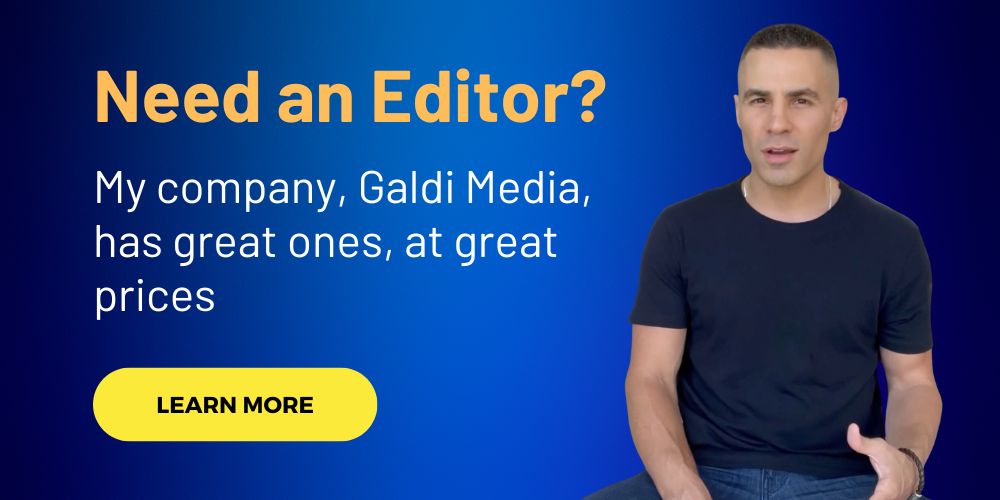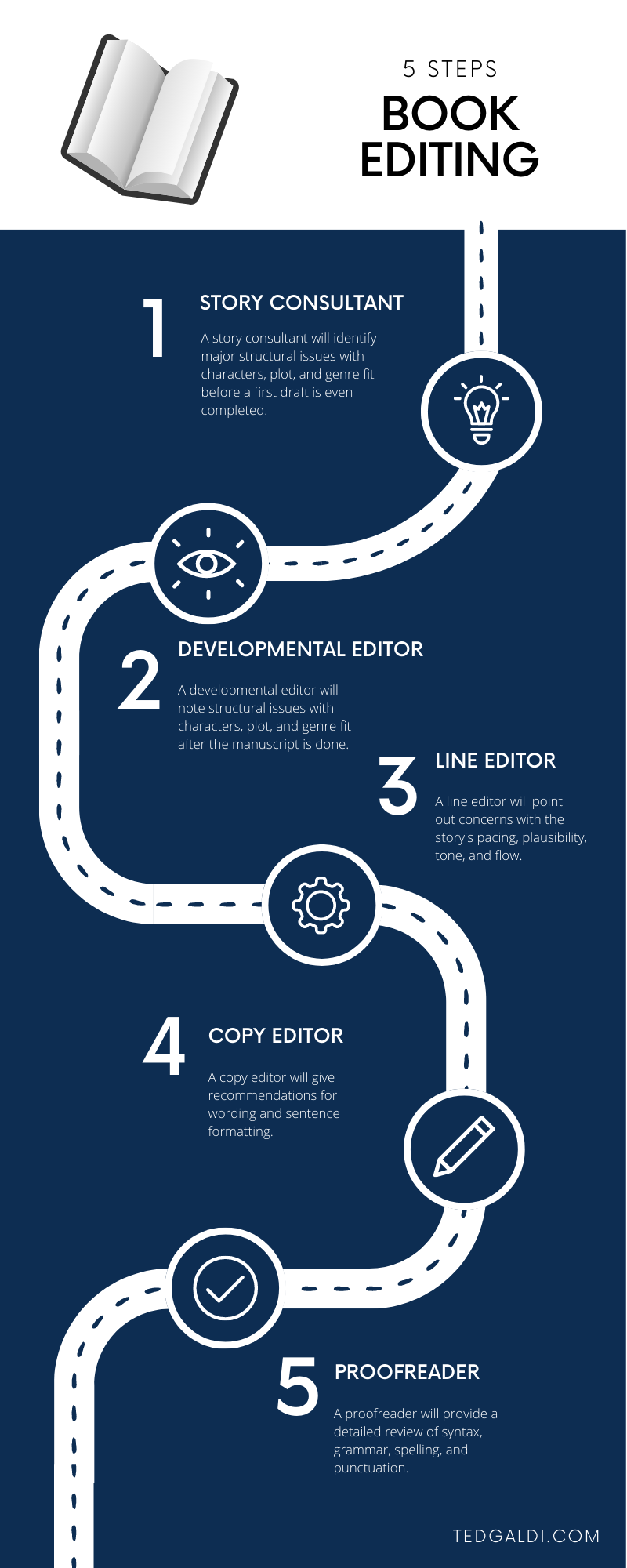The Ultimate Guide to Book Editing: Types and TipsEditing is a critical part of the book-publishing process. This ultimate guide explains the different types of book editing services available and provides tips for choosing the right editor for your manuscript. What is a book editor?A book editor is a publishing-industry professional who'll read your manuscript and propose various changes in an attempt to make your story stronger. These proposed changes can range from high-level comments about characters and plot, down to alterations of specific words, like for typos. Book editors play pivotal roles for both fiction and non-fiction projects. Though you should self-edit your manuscript as you're writing, having another set of eyes go through the document is crucial. If a publishing company acquires your manuscript, they'll provide editors for it. However, if you're self-publishing your book, you'll be responsible for hiring your own editors. FYI, you can learn more about both publishing options in my book publishing guide. Even if you're great at self-editing, with a manuscript that's 50,000 - or even 100,000 - words, you may miss something. And once you publish your book, especially if you're selling hard copies, fixing an issue that a reader points out can be very difficult and time-consuming. You're better off working with an editor prior to publishing to make sure the version of your book you share with the world is as good as it can be. What are the different types of book editing services?Book editing services exist on a spectrum, ranging from broad/subjective feedback to narrow/objective:
Click a service above to read more about it, or just keep scrolling down this page to hear about them all. What is developmental editing?Developmental editing, sometimes referred to as structural editing or story editing, is focused on identifying major issues with a story's plot and characters, plus genre fit. The editor offers purely subjective opinions. As the author, you ultimately decide if you want to change your story to reflect the recommendations. Feel free to incorporate all, some, or none. For example, a developmental editor may say:
Though developmental suggestions can give a story a major boost, they sometimes require a major rewrite by an author, which might take months. Thus, if your story has any foundational issues with plot, characters, and/or genre fit, you should try to identify them before you've spent time writing a full manuscript. Ideally you'd do this in your "outlining" stage or even sooner. A story consultant can work with you to find and fix these issues early. If you resolve them before finishing your manuscript, when you eventually hand it off to a developmental editor, the edit suggestions you'll receive likely won't yield large rewrites. If you already have a completed manuscript draft and you're ready for a professional to give it a developmental edit, check out my company's affordable editing service. What is line editing?Line editing also entails subjective feedback, yet it's narrower than developmental input, usually at the chapter, scene, or paragraph level. A line editor typically comments on pacing, plausibility, tone, and flow. For instance, a line editor may say:
As the author, you decide if you want to address all, some, or none of these recommendations in the next draft of your manuscript. Ideally, you should pass your manuscript to a line editor after any structural issues have been addressed, ie what a story consultant and development editor handle. Need line editing? My company, Galdi Media, offers a high-quality book editing service. What is copy editing?Copy editing mostly involves recommendations on word choice, and paragraph and sentence formatting. A copy editor may give an opinion to replace a word with another, not because the original was "wrong" in a black-and-white sense, but because the alternative may have stronger impact. In other cases, a copy editor would point out formatting issues with sentences that are objectively in violation of grammatical rules. Since copy editing and proofreading (discussed next) both address grammatical problems, certain editors provide both services in a package. Other editors may encompass line editing into these packages as well, ie one editor would go through your manuscript providing recommendations across three editing categories. While copy editing, an editor may say:
Like other types of editing, opinion-based recommendations should be assessed by the author before reflection in the next draft. As for objective errors, unless an author is purposefully including them for stylistic reasons, they should be fixed in the next draft. Ready for copyediting? Learn more about my company's editing service. What is proofreading?Proofreading is the narrowest form of book editing. The feedback is almost exclusively objective, focused on errors in syntax, grammar, spelling, and punctuation. For stylistic reasons, especially in dialogue, grammatical errors may be intentional by the author. For instance, if a certain character is uneducated, his naturalistic way of speech may include mistakes with tense. A proofreader should point these issues out just in case they weren't intended. That being said, much proofreading makes note of typos, homophone confusion, and other objective mistakes authors should surely fix in the next draft. For example, a proofreader may say:
Need proofreading for your manuscript? My company, Galdi Media, offers it as part of our manuscript editing service. How long does a book edit take?The turnaround time of a book edit primarily depends on the length of your submitted manuscript and the type of edit you need. At my company, Galdi Media, we believe all books should receive developmental, line, and copy/proof editing, which we include for all authors who partner with us. If a single editor is providing you a combined service across editing types (like we offer), the turnaround time would be much quicker than taking your manuscript to a different editor for each stage. At Galdi Media, typical-length manuscripts can be edited in about 4 weeks. How much does a book edit cost?The price of an edit hinges on the length of your manuscript and the type of editing you need. If you order a combined service from a single editor (like we offer at Galdi Media), the fee will be much lower than purchasing the services individually, from different editors. Pricing for editing is based on the length of your manuscript, ie word count. If you were to purchase different editing types individually (which I don't recommend), their cost vary based on the broadness/subjectivity of the service. Ie, developmental editing would be the most expensive, and proofreading the least. How does the book editing process work?After ordering an editing service, an author would submit the latest draft of the manuscript, usually as a Microsoft Word file. After the editor completes the job, the author is provided with feedback:
Ready to improve your manuscript?If you have a manuscript ready for editing, check out the Galdi Media editing service.
0 Comments
Leave a Reply. |



 RSS Feed
RSS Feed